#If only we knew..
Explore tagged Tumblr posts
Text
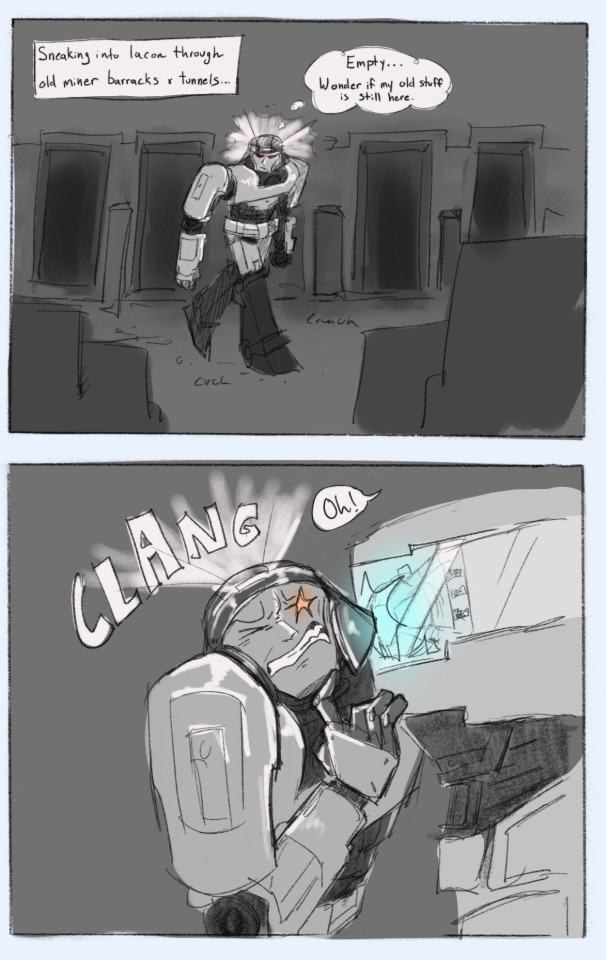
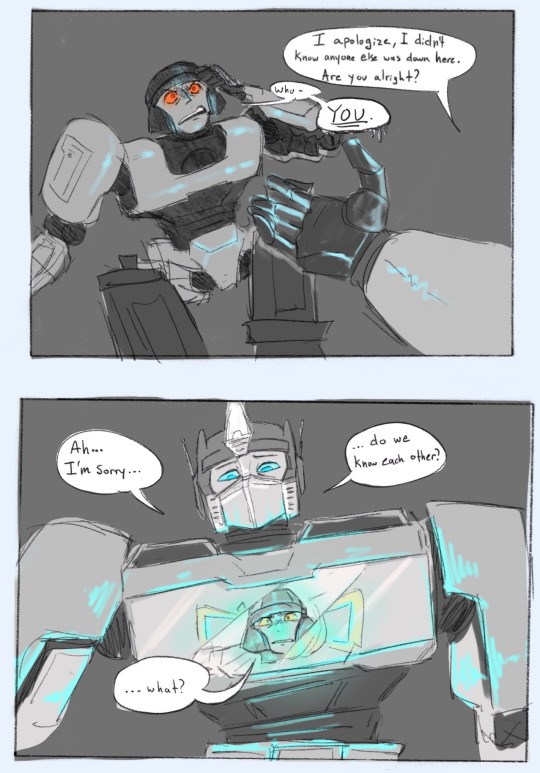
You know how in TFP Optimus can’t really remember what happened during his time without the matrix. Yeah. The sad version of this what if Optimus met cogless Megatron.
Cont from this, and this
#transformers#macaddam#transformers one#megatron#optimus prime#tf one#d-16#tfo megop#version one is the matrix is slowly forming Op into the ideal leader it needs#getting rid of parts of Orion that aren’t leader like (his weakness to d-16 or his unruly personality)#version two is op willingly letting the matrix erase his old memories bc remembering who he used to be is too painful with d-16 gone#it culminates in thing like Elita saying remember that one time we…#and Op being no not really but can you remind me again haha#the autobots who knew him before are obv concerned but they accept it in the end as op’s sacrifice for the greater good#Megatron being the only one outraged on op’s behalf vowing to take the matrix back out#just another thing they looked up to being false#but also secretly being relieved bc that means all those thing prime did he didn’t mean it! and the pax he knew is just stuck in there#and he would def join him once he frees him#(both of these are false)
4K notes
·
View notes
Text
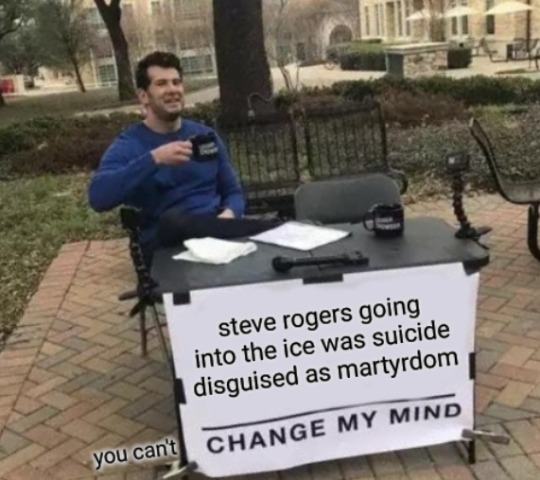
every day i wake up and am mad at the end of steves storyline and the full and complete lack of people who GET IT
#steve rogers#stucky#captian america#bucky barnes#captain america the first avenger#peggy litterally found steve alone in a destroyed bar after bucky “died” trying to get drunk or drink himself to death#blameing himself for bucks death#then peggs goes and says “allow barnes the dignity of his choice” in reference to him falling from the train#THEN when steve is gonna crash the carrier#BRO LITTERALLY SAYS “THIS IS MY CHOICE”#GIRL WE GET IT#you couldnt stand being without him so you decided the only way to join him was in death#but he knew it would be seen as heroic to die that way#THERE WERE OTHER WAYS TO LIVE AND SAVE THE WORLD#but he chose the one that let him claim martyrdom#n e ways#i would and will eventually write many essays about them but for now i am gonna go back to pretending to do homework#also if anyone has fic recs gimme
6K notes
·
View notes
Text
I’m actually LOVING how Rick Riordan, and the other writers of the show, took his initial concept of a Percabeth rivalry fueled by that of their parents and kind of turned it on its head?
Now, instead of Annabeth being wary of Percy because he’s a son of Poseidon, he’s wary of her because she made a callous impression on him. They get off to a rocky start even before finding out who Percy’s father is, and when they finally do, Annabeth doesn’t care. Instead of them fighting because of who their parents are, they’re fighting over their own opposed worldviews.
Then, instead of them arguing over which of the gods is cooler and who was right in the story of Medusa, they realize that, just like Medusa, Annabeth is a victim of her mother and that, unlike Medusa, she is a far kinder and stronger person, unwilling to repeat the cycle of hurt. They realize that, like his father, Percy often acts without considering potential consequences and that, unlike his father, he is a far kinder and stronger person, willing to step up for someone he wronged and whom he cares about.
Instead of Percy and Annabeth’s rivalry being focused on that of their parents, it’s focused on who they are, themselves. But the path to friendship is still the same: a realization that they have each other’s backs, no matter what, because they’re not their parents after all.
#i kind of typed this in my essay voice because I knew it would be long so ignore that#also I don’t actually know which of the other writers are playing big parts in percabeth’s story so threats why I put a focus on Riordan#that’s*#aaaaanyhoo if I’m being honest I definitely prefer this version of percabeth#AND I like that Medusa said ‘‘we are not our parents until we choose to be. you three have chosen’’ implying that she thinks they’ve chosen#to be their parents only for Percy to reveal in the next episode that he’s chosen to be better than his father.#that was a really nice touch 👌👌👌#percy jackson and the olympians#pjo#pjo disney+#percy jackson disney+#percy jackson#annabeth chase#Percabeth#rick riordan#Medusa#pjo tv show#pjo tv series#pjo tv spoilers
13K notes
·
View notes
Text
i have suddenly become obsessed with a theme that HoO established but never proceeded to extrapolate on, which is:
You are Percy Jackson, and you have been swapped with a boy who was allegedly everyone's favorite person, but they have decided to replace him with you. They just met you. You stand next to his best friend and the people he's known his entire life. In his home. In his cloak. In his place. They stopped looking for him.
You are Jason Grace, and you have just found out you have a long lost sister who completely replaced you in her life with this girl you just met. Your lives and personalities are mirrors. She is you, living the life you were robbed of.
You are Annabeth Chase, and you have just become starkly aware that you have been inhabiting the void left behind by your best friend's long lost brother. You and Luke were just replacements for him. Now you have to look him in the eyes when he has nothing and know you took that life from him.
You are Piper McLean, and you have just found out your relationship is fake and built entirely on the memories of Annabeth Chase. You have been given a boyfriend when hers has been taken away. You have no idea how much of it is real or not but regardless you feel like if your relationship isn't exactly in their image that you have failed.
You are Leo Valdez, and you have just learned that you are the echo of your great-grandfather. You are not your own person. You just exist to be a mirror of him. A doppelganger. An actor and stunt double facing all the danger he never had to but wearing his face. To be there for his best friend decades later simply because he couldn't. You are playing a role. A seventh wheel and a pawn for a goddess who carefully sculpted your entire life for her own purposes.
You are Hazel Levesque, and the only reason you are alive is because your brother couldn't save your his sister. You are a consolation prize. An apology. Your existence here is misplaced in every way but you inhabit it anyways.
You are Frank Zhang, and you are a shapeshifter. Inhabiting your own body feels strange and clumsy when you could be literally anything at any time. You are anything and everything and live your life with the simple certainty of knowing exactly how you will die.
#pjo#hoo#heroes of olympus#percy jackson#riordanverse#jason grace#annabeth chase#piper mclean#leo valdez#hazel levesque#frank zhang#meta#analysis#me shaking hoo: what if we actually address the interpersonal dynamics of the characters. please. please. please. please.#frank is the only person on the boat not having an identity crisis tied to another member of the crew somehow and that is FASCINATING#but also WHERE is all the interpersonal literally anything. hello. please. making grabby hands. everybody identity crisis go.#i wanna see the entire argo ii crew stumbling through trying to figure out their places and senses of self!!!!!#particularly in relation to each other!!!!! we get snippets but we rarely ever get the full thing or a resolution!!!#like. HELLO??? Piper acknowledging that her relationship with Jason is artificially sculpted in the image of Annabeth and Percy???#and that her ideals of what Jason and her can be are just that she feels like they need to be like what Percy and Annabeth have????#and thats just DROPPED COMPLETELY????#poor Jason is getting replaced twice. Leo is not his own person.#Hazel at least gets the resolution that Nico does not truly see her as a consolation prize#but Annabeth gets to be hit with the like EIGHT YEAR DELAY of learning the place she inhabits in Thalia's life is the echo of someone else#cause like. yeah she knew Thalia had lost her brother but i dont think it clicked for her until she met Jason that oh. she *replaced* him#Frank at least has some certainty about his identity in one aspect (his curse). everybody else is floundering a bit#except for maybe Percy but its kind of the camps of ''i replaced this person and it weighs on me'' versus ''i have been replaced''
3K notes
·
View notes
Text

FNAF movie Vanessa was out of pocket for this one..
#myart#chloesimagination#comic#fnaf#five nights at freddy's#vanessa fnaf#vanessa afton#vanessa shelly#mike schmidt#fnaf movie#fnaf fanart#More Vanessa thoughts comics!!#NOW I have drawn this scene before but this part also tuck out to me#VANESSA throwing away Mike’s sleeping pills was wild of her#EVEN before I knew her whole deal with William this part stuck out BAHA#this is Vanessa’s one uncalled for action in the whole movie#I GET why she probably did it was so he couldn’t get closer to the truth about her father etc#but Mike is not only mentally unwell but financially too 💀#he probably needed those Vanessa#I WONDER if she felt bad after like oops he may of needed those 💀💀💀#still love her though we all have our flaws 🙏🏾🩵
6K notes
·
View notes
Text
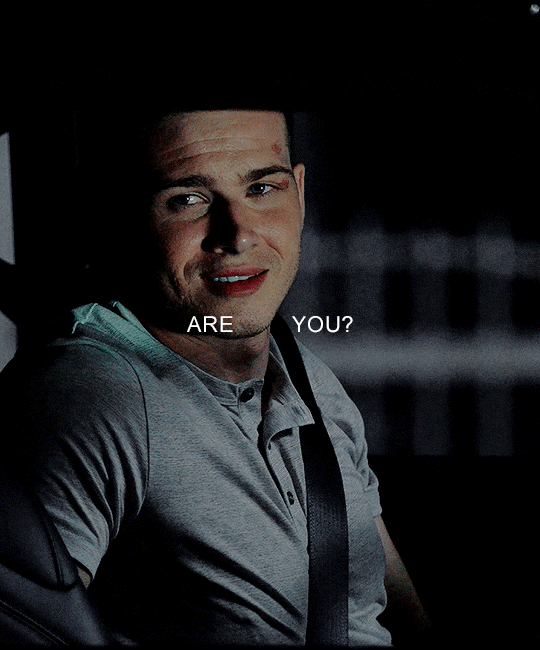
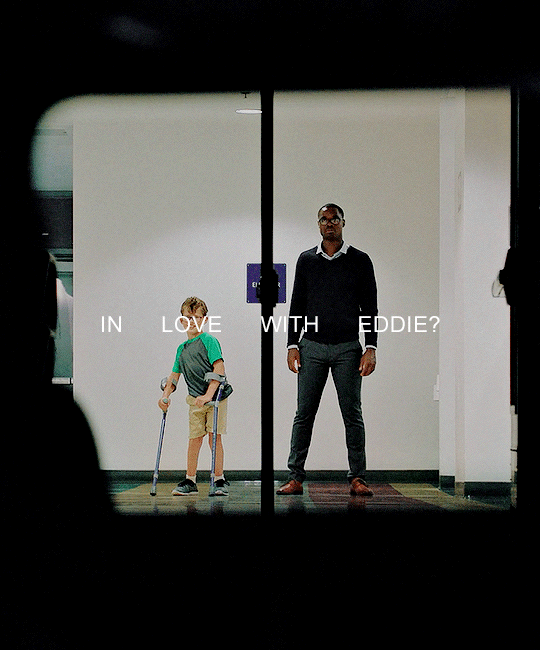

#i still can't believe these are actual lines from the show#we used to dream of days like this#i firmly believe this is the moment buck had his first “oh” moment#seeing eddie with chris like that...#if only he knew he had an “oh” moment#911edit#buddie#evan buckley#eddie diaz#911 abc#911#mine#1k#sofia.gif
1K notes
·
View notes
Text


Lambert has a flower festival every spring and also im finally free from artblock 😭😭
+ the thinkersssss

#head empty only pretty lamb in there#narinder knew he wanted to keep them since halfway through silk cradle#he realises that he wants to keep them in Other Ways too#and immediately decides to play the LONG game 😭#sheep customs my beloved im full of ideas#narilamb#cotl lamb#cotl narinder#cotl#my art#we are so back chat#cotl fanart#nari: 🤲❤️#lamb sweating: /platonic or /romantic#cult of the lamb#main cotl verse#narinder x lamb#cotl heket
969 notes
·
View notes
Text
America's Sweetheart

summary : Jack Abbot shows up for the Fourth of July, three years since you last saw him. You’re 23 now—older, sharper, and very much not the girl he remembers. The tension builds fast: porch stares, jealous glances, a game of chicken no one wants to win. He nearly breaks. You make sure he does.
word count : 11,152
warnings/content : 18+ MDNI explicit sexual content, age gap (23/f, 40s/m), dominant/submissive power dynamics, jealousy, mutual provocation, grief, war trauma, PTSD references, mention of past death of a spouse, mention of a past death of a parent (mother), emotionally charged arguments, manipulation, dad's best friend trope, use of another character for jealousy, emotional repression, messy feelings, public setting tension, intense eye contact as foreplay, one bed (brief), reader is not innocent, reader is the problem (affectionate), Jack is also the problem (derogatory), slow burn with porn-level payoff ?
July 3rd, 4:42 PM – Westmoreland County, Pennsylvania Outside of Pittsburgh. It’s humid. The cicadas are screaming like the past never left.
You hear the truck long before you see it, old engine, cracked muffler, the kind of sound that makes the birds stop screaming. The tires bite gravel. The engine cuts out. Then nothing. You’re on the porch already, pretending to read. One leg slung over the other, a cold glass sweating in your palm. You don't look up. Not right away. Not until the driver’s side door groans open.
He came.
For the first time in almost three years, Jack Abbot is back in Westmoreland County. Back in your father’s house. Back into orbit, like a planet pulled from whatever distant axis he’d exiled himself to. He steps out of the Silverado like someone who’s not sure the ground wants him back.
The engine ticks behind him, overheated, sun-fatigued, too old for this road. It’s the same truck he’s had for over a decade, still bearing the dent in the rear bumper from when someone backed into him in a Walmart parking lot and he refused to get it fixed because “it’s cosmetic.” He gets out slow, jeans loose at the knees, white t-shirt clinging at the chest. The cuff of his right pant leg settles just right over the boot that hides the prosthetic. Below the knee, right side, carbon composite. You’d never notice. Unless you already understood what to look for.
But you do. You know more than he thinks you do.
Jack Abbot was a combat medic. Afghanistan. Did three tours before the last one took his leg and the rest of what he hadn’t already buried. The records say “non-life-threatening injury.” The look in his eyes says otherwise. He doesn't talk about the explosion. He doesn’t talk about the two men he tried to save and couldn’t, or the third whose name he still says under his breath when he thinks no one’s listening. What’s worse, though, what he never talks about, is what happened at home while he was gone.
His wife.
She worked nights at PTMC, was the kind of nurse who didn’t speak unless it mattered, who remembered birthdays and blood types in the same breath. She was calm in the way trauma nurses have to be. Capable of turning a scream into a code and a code into a rhythm. Dana liked her. Which is to say: Dana gave her hell, trusted her anyway, and never asked twice when she needed coverage. Her handwriting was a mess. Half-print, half-cursive, always rushing somewhere. He loved that about her. Said it looked like urgency in motion. She burned fall-scented candles deep into summer; warm vanilla, clove, too much cinnamon. She knew he didn’t like the smell, but she lit them anyway, and he never said a word. He hated the scent, but he loved her more. She hated small talk. Hated pity. Hated the way cafeteria microwaves never got anything hot all the way through. But she loved warm socks, old mugs, and the last ten minutes of any shift when the adrenaline gave out and everyone finally got quiet.
They lived in Robinson Township, in a house with red kitchen walls and a porch that creaked when the wind hit just right. A house Jack had keys to before he ever figured out what it meant to stay. She gave him six days in the summer of 2005. He gave her five and a letter he didn’t plan to leave behind. She never brought it up. Not once. But when he came back months later, washed out and bone-tired and finally willing to look her in the eye, she opened the door and said the only thing she ever asked of him again:
"You never leave like that ever again."
He didn’t.
They got married quietly. No cake, no dress, no music, no audience. Just a courthouse, two pens that barely worked, a clerk who didn’t look up, and a shared last name that didn’t feel like a question. She kept wearing his t-shirts to bed, always the softest ones, stretched at the collar and warm from the dryer. They argued about the thermostat like it meant something, like the temperature could settle the weight between them. And some mornings, before either of them spoke, she’d make toast and leave a note by the coffee: Buy milk. Or Don’t forget your charger. Or Come home meaner, I dare you. He keeps that one. Folded. Soft at the edges. Glove compartment. Always.
She died in winter. A back road, black ice, a semi she never saw coming. He was overseas. In another country. Another war. Patching someone else together while the woman who taught him how to stay bled out on asphalt an ocean away. By the time he landed back in Pittsburgh, the house was exactly as they left it. Her badge still clipped to the fridge. Her scrubs folded on the dryer. A bottle of half-used lemon cleaner under the sink, cap loose like she’d meant to come back for it. In the bedroom, her notebook was still open on the nightstand. He stood in the doorway for less than an hour. Didn’t touch the lights. Didn’t sit on the bed. Didn’t open the drawer where she kept the post-its.
He kept the house. Paid the bills. Replaced the water filter when the light came on. But he never moved back in. Instead, he rented a condo closer to the hospital. Said it was temporary. Said the commute was easier. But he knew what he was doing. Even back then. Even with the war still clinging to him. He was going to go civilian. Go legit. Take everything he learned patching people together in tents and turn it into something permanent. Residency. Scrubs. Real name on a badge.
He signed the lease five months before the blast took his leg.
The house in Robinson Township stayed exactly where it was. Waiting. Still full of her. He tried therapy twice, then quit when the second one asked how often he thought about forgiving himself.
Your father didn’t know any of that when they met. They weren’t in the same unit. Didn’t know each other overseas. They met at a VA support group in the basement of a Unitarian church—two men sitting too far apart on folding chairs, half-listening to someone read aloud from a worksheet titled Finding Purpose After Loss. Jack never spoke during the sessions, but he always stayed late. Your dad did too.
They didn’t bond over war.
They bonded over what came after.
Your mom was diagnosed with cancer just before your sophomore year of high school. Pancreatic. She was gone in six months. After that, your dad started showing up to group every Tuesday. Said it made the evenings easier. Said there was something about the way Jack didn’t talk that made everything quieter in his own head.
They’d sit on the curb after meetings, drinking from bottles in paper bags like they were back in high school. Talked about absolutely nothing. Water pressure. Dog food brands. VA red tape. They didn’t call each other friends. That would’ve been too sentimental. Too soft. But when your dad says buddy, Jack shows up. And when Jack slurs brother at the end of a bottle, your dad never corrects him. Neither of them remarried. Your dad said no one could handle how he grieved. Jack said no one should have to. And now he’s walking up the porch steps, sun in his eyes, curls matted under a hand he drags across his face like he's hoping to wipe it all away.
“Jesus,” your dad says, stepping out behind you. “I’ll be damned.”
“You already are,” Jack mutters, squinting. “I just came to make sure the rumors were true. You still live like this?”
“Worse. We put the flag up.”
Jack glances at the porch post—flag pole angled just right, stars flapping lazy in the July air. “I hate that thing.”
“Then I knew you’d show.”
You finally speak. “Well, look what the wind blew in.”
Jack’s eyes land on you for the first time. And it’s not a casual glance. It's a diagnosis. You’re not a shy undergrad in last year’s band tee. You’re twenty-three, two semesters deep in a policy program that’s made you sharper than steel. You know how to make yourself look harmless, and how to make someone regret believing it. You didn’t even know if he’d actually show. Your dad said he was “trying to convince him”—had been for weeks—but he was always like that: half-ghost, half-promise. You're wearing a ribbed tank top, faded from too many washes, braless but not on purpose, just because it was hot. Loose drawstring shorts, hemmed just above mid-thigh. Not tiny. Not suggestive. Just comfortable. Skin sticky. You hadn’t dressed for him. But now that he’s standing there in jeans and a white t-shirt, eyes flicking over you like he’s clocking every inch, it kind of feels like you did. And it hits you all at once: This isn’t the last time you’ll think about your outfit around him.
Jack doesn't blink. “Didn’t know you were home,” he says.
“I’m not,” you reply. “Just visiting. Like you.”
He exhales through his nose. “Right.”
Your dad claps him on the back. “C’mon in. AC’s holding on by a thread, but there’s beer in the fridge and the couch hasn’t gotten any softer. Jack huffs something close to a laugh.
Later, 6:02 PM The fan spins overhead like it’s trying to be helpful. It isn’t.
You’re barefoot on the kitchen tile, wooden spoon in one hand, a cast iron pan hissing softly in front of you. Butter, garlic, crushed red pepper, aromatics rising into thick July air. The A/C is technically on, but it’s been losing the battle since noon. The house is warm in the way childhood homes always are. Memory trapped in drywall, grief in the vents. From the living room, you hear the crackle of a baseball game through uneven speakers. Your dad yells something at the screen like the Pirates can hear him. You don’t follow baseball. You know the rules, just not the religion. They’re not even winning. They never are. But that doesn’t stop him from narrating every pitch like it’s the playoffs. You’re slicing tomatoes when the work phone rings. Sharp tone. Your dad picks it up with a muttered curse.
"Yeah, I'm here. Go ahead."
The hallway swallows his voice a moment later. You glance at the clock. Jack hasn’t said much since he got here. He didn’t need to. He’s already said enough by showing up. Three years of hearing about him. Three years of your dad saying “Jack this” and “Jack that.” Three years of seeing the ghost of him in backyard chairs, photos tucked into drawers, stories told at half-volume. And now he’s sitting on your couch in a white t-shirt and jeans like nothing happened. You stir the pan and flip the burner down. He enters the kitchen a second later. You can feel his presence when he enters. The air shifts. Denser. Sharper. A presence like gravity pressed into the edges of your shoulder blades.
Jack’s standing in the doorway with a beer in his hand and the kind of posture that looks casual but isn’t. Like his body still runs on threat assessment. His white t-shirt’s damp in the places that count. Under the arms, at the small of his back, behind the neck, clinging just enough to make you wonder how long he sat in the truck earlier before coming inside. It’s soft with age, stretched a little at the collar, like most things in his life: functional, worn, and not replaced unless absolutely necessary. He looks at you. Not up and down. Not obvious. Just long enough to take in bare legs, sticky collarbones, and the way your top clings where it shouldn’t.
“Need help?” he asks, voice low, lazy. Like he already knows the answer. You don’t turn around right away. Just lift the spoon, slow and deliberate, as steam curls up from the pot.
“I’m not helpless, Jack.”
He steps inside anyway. Leans his shoulder against the doorframe. “Didn’t say you were.”
You glance at him over your shoulder, just enough to catch the way his gaze drops then snaps back up like nothing happened. “I’m just saying,” you continue, too light, too easy, “if you’re offering out of some outdated sense of chivalry, don’t. I can handle a little heat.” You’re not talking about the stove. You both know it.
Jack smirks, slow and dry. “That why it’s ninety degrees in here?”
You hum. “It’s the simmering tension.”
He takes a sip of his beer, then nods toward the pan. “Or maybe it’s the five cloves of garlic you just dumped in there.”
“That’s called flavor,” you say, turning back to the stove. “You might’ve heard of it.”
There’s a beat of silence behind you. Then, quietly: “You always were a little mouthy.”
You smile to yourself. Stir once. Let the moment breathe. Jack steps farther in. Sets his bottle down. You hear the sound it makes, a dull thunk against the laminate.
“I’ll chop.” He doesn’t wait for permission. Just moves toward the cutting board you left on the counter and grabs a bell pepper from the bag. His hand brushes yours when he picks up the knife. Not enough to register as a mistake. Just enough to stay with you.
You glance over at him. The side profile. His jaw. The curve of his back. “How’s the condo?” you ask.
He shrugs. “Quiet.”
“Still renting?”
“Still not planning on staying.”
You nod. “That’s what I figured.”
He keeps chopping. Slow. Even. Efficient like everything he does. The silence stretches out between you again. You move to the sink to drain the pasta. He stays at the stove, now stirring the tomatoes like he’s done it a hundred times. Like he belongs there. And that’s the problem.
He used to.
He used to come by on Sundays. Used to wear his boots inside. Used to carry grocery bags in one arm and a six-pack in the other. You were still in high school. Still thinking you understood grown men just because you’d read Joan Didion once.
"I didn’t think you’d be here," he says, then adds, "figured you’d be too busy partying in D.C. with your grad school friends, running policy circles around senators or something."
You dry your hands on the dish towel, careful not to meet his eyes. “I didn’t know you’d come.”
“Your dad didn’t mention it?”
“He did.” You fold the towel in half. “But your name’s been his excuse for things before.”
Jack nods once. Slow. Not defensive. Just resigned. You lean on the counter beside him. His shoulder is 15 centimeters from yours. You could feel his breath if he sighed.
“You’ve changed.”
“So have you.”
He doesn’t answer. He just tilts the bottle to his lips and drinks. And for a second, all you can hear in the kitchen is the hiss of garlic and oil behind you—and the way your name almost lingers in the air like something he won’t say.
July 4th, 12:32 AM The porch creaks. The cicadas are quiet. And nothing good happens at this hour—except everything almost does.
You push the screen door open with your hip. It sighs shut behind you like it knows better. Jack doesn’t look up. He’s on the bottom step, forearms braced on his knees, head tilted just slightly. His t-shirt clings to his back, soaked through in patches. His beer—half-warm, untouched—rests beside his boot.
You walk to him barefoot. Sit two steps up. You don’t speak.
Not yet.
The air is thick. Damp. It smells like fireworks and asphalt and the past. Your thighs stick to the wood, your tank top to your spine. The shorts—America’s Sweetheart, marine blue cotton, cut high and soft from too many washes—cling in the wrong places and the right ones. You’d thrown them on before bed without thinking, worn them a hundred times without consequence. But now, out here, with him sitting just below you and not looking, they feel intentional. You didn’t change before coming outside. And you don't plan to.
“Couldn’t sleep?” you ask.
“No.”
“Still wired for hospital hours?”
Jack’s voice is low. “Still wired for war.”
You say nothing. He says less. So you try again. “My dad still thinks you’re half-avoiding the Fourth.”
“I’m not avoiding it,” Jack mutters, voice flat, like gravel soaked in heat.
You raise a brow. “Then what are you doing out here at midnight?”
He shrugs, slow, one shoulder tighter than the other. “Thinking.”
“About?”
His fingers flex slightly around the neck of the bottle. “Things I shouldn’t be thinking.”
You lean back on your palms, stretch your legs until your calf brushes his shoulder. Not by accident. “I’m not trying to make it worse,” you say. He glances at you. A quick flick of heat. Then gone.
“I know what I’m doing,” you add.
Jack shifts. Just barely. “You’re your father’s daughter,” he says. It’s not kind. It’s not cruel. It just is.
You nod. “So?”
“So you should be asleep.”
“You should be honest.”
That lands. He turns his whole body toward you now. His eyes drag down your legs. Your throat. Linger at your mouth.
“I notice everything you do,” he says. “Every fucking thing.”
You don’t breathe.
Jack’s voice drops lower, rough at the edges. “You changed into those shorts like it wasn’t on purpose. Like you didn’t know exactly what they say across the back, or how high they ride up when you lean over.”
“I don’t wear them for your attention.”
He stares. “But you don’t mind when you get it.”
Your pulse kicks. You try to swallow. It’s hard. You whisper, “Do you want me to stop?”
Jack’s hands curl into fists on his knees. “That’s not the problem.”
“Then what is?”
“The problem,” he says, “is that if I get up and touch you, if I put my mouth on you, I’m not going to do it soft. I’m not going to be sweet. I’m going to take.”
Your legs clench. He exhales like it hurts to hold it in. “I’m going to get your knees over my shoulders right here on this porch,” he says, voice low and frayed, like the thought of it already has his hands shaking, “and I’m going to forget every reason why I shouldn’t.”
It’s not a line. It’s not even a warning. It’s a fact. Strong certainty in his voice, like it’s dragging heat up from somewhere deep in his gut and trying to tamp it down before it explodes. You blink once but your body reacts before your brain can catch up. Your stomach sinks. Your thighs press together. The ache hits all at once, sharp and physical and throbbing, like your skin understood the promise before your mind even realized what was happening. Jack doesn’t move. His face is barely lit by the porch light bleeding through the screen door, but you can see the tension in every line of him, the locked jaw, the flared nostrils, the way his hands flex uselessly at his sides like he wants to touch you but knows what’ll happen if he does. He looks at you, and for the first time since he walked back into your life, he doesn’t look guarded. He looks like a man seconds from giving in.
“You understand?” he asks, quiet but not soft. There’s nothing soft about it,nothing gentle in the way his voice scrapes across your skin like it knows exactly where to land.
You nod. Just once. The smallest movement. But it feels massive.
“I do,” you say.
And it comes out lower than you meant it to. Breathless, a little hoarse. Like your body heard the word shoulders and hasn’t stopped pulsing since. Like your legs are already curling from the tension, the pressure, the restraint. From everything that hasn’t happened yet and still feels like it did. Jack stays crouched for a second longer. Then, slowly, like he’s not sure if standing will make it worse, he rises. He steps up. One stair. Then another. Just enough to bring himself level with you where you’re perched, legs bare and half-draped across the wood. He doesn’t touch you. He doesn’t speak. He just looks. And that’s worse.
Now he’s standing between your knees, close enough to tower without looming, his chest rising sharp beneath the thin stretch of his shirt. You can smell him, clean sweat, beer, something sunworn and worn out. His eyes track every inch of your face, down your neck, and settle on your legs. You don’t pull away. You let him look. You want him to.
Jack doesn’t move. Doesn’t reach for you. But you can feel the effort it’s taking not to. His hands hang at his sides like they’re waiting for orders. Like they remember what they used to do when they were allowed to want something and take it. The porch groans faintly beneath both of you, but neither of you shifts. He’s not touching you.
But it feels like he is.
The heat from his body pours over your skin like a warning. Your thighs are warm, throbbing. You feel it in your chest, in your stomach, in the slick place between your legs that’s already aching from the promise he made but hasn’t kept. Still, he doesn’t lean in. And that restraint, that quiet, Jack Abbot-brand control, makes it feel dirtier than if he had. Like he already has you. Like he’s already ruined you. And maybe he has. You shift slightly, tilting your hips just enough to open your knees. Bare. Flushed. Warm. It isn't a performance. It's instinct. A reaction. An offering without asking. Not coy. Not cruel. Just there. Just true. And Jack sees it. His eyes flash down, and something in him goes still in that way that isn't calm, it’s deadly. Like a trigger pulled halfway.
You tilt your chin up. “If you’re going to walk away, do it now.”
He doesn’t answer right away. Doesn’t blink. Then, slowly, like it costs him, he looks away. His mouth hardens. His shoulders shift back like he's bracing for impact, like walking away is harder than staying. And then he moves. Not fast. Not abrupt. But deliberate. With the finality of someone pulling themselves out of a burning building and leaving the match behind. He takes a single step toward the door. Then stops. His voice, when it comes, is rough. Quiet. Wrecked.
“Go to bed.”
You don’t move. He turns slightly, just enough to look at you over his shoulder. His mouth is parted like he wants to say more, but the words get stuck somewhere in his throat.
You swallow. “Jack—”
He cuts you off, voice sharper this time. Controlled only by effort. “Go to bed,” he repeats, eyes locked on yours now. “Because if I say one more word, I’m not going to walk away. And you’re going to let me.”
You don’t speak. There’s nothing left to say. He walks inside. The screen door hisses closed behind him, and the silence left in his absence isn’t silence at all. It’s loaded. It’s loud. You sit there for a long time. Legs still parted. Breath shallow. Mouth dry. The porch beneath you buzzes with the overwhelming sense of heat. You can feel the heaviness of where he almost touched you, like it left a bruise. And nothing happened. But your thighs are still warm. Your heart still racing. And your body, wrecked by everything he didn’t do, doesn’t know the difference.
July 4th — 2:17 PM The backyard is full of smoke, sweat, cheap beer, and men who talk like the war never ended.
The grill’s already flaring by the time you come outside. The back porch is crowded, the kind of crowded that smells like beer and bar smoke and the same five stories told on rotation. The grass is patchy. Burnt in the spots where the sun lingers longest, soft only where the sprinkler’s overshot its aim. A folding table buckles slightly in the middle under the weight of plastic tubs full of potato salad and grocery store buns.
The playlist’s stuck somewhere between Springsteen and Seger, blaring from a speaker your dad duct-taped to the porch rail. You can feel the heat. It’s oppressive. Sticky in that Pennsylvania way. It presses into your spine, rolls down your neck, clings to the bend of your elbows and the backs of your knees. Your tank top’s wet at the lower back. Your shorts ride up every time you shift. You stopped trying to fix them.
Your dad’s in rare form, commanding the grill like it’s a combat zone, beer in one hand, metal tongs in the other. He’s holding court with three of his oldest friends: Torres, Mancini, and Calhoun. They’re all wearing sunglasses, cargo shorts, and opinions. Men who talk like everything after deployment was just filler. Their laughter is too loud, their stories too sharp at the edges. It’s not nostalgia. It’s muscle memory.
Jack is there too.
He’s not talking much. He never does. But his presence is heavier than theirs. Quieter. He’s leaned up against the fence post, beer held loose in one hand, watching your dad talk like he already knows the punchlines.
He’s wearing an old Harley-Davidson t-shirt, sun-bleached and threadbare, the black cotton gone soft with age, the orange logo more memory than print. There are two holes near the hem and another at the shoulder seam, like it’s survived more summers than it should have. His camo cargo shorts hang low on his hips, loose, worn-in, one pocket fraying at the edge. The belt’s gone, replaced by the way his body holds itself together. His prosthetic is visible now—just under the cut of the fabric, dark carbon where skin should be. He doesn’t hide it. Doesn’t draw attention to it either. He shifts his weight like he’s done this a thousand times in a thousand places, quietly, precisely, like the act of standing is a skill most people don’t earn. Like a man trained to not draw attention. He’s good at it.
Except you’re watching. And you’re done being quiet about it. You haven’t said more than six words to him since last night. Not since the porch. Not since he stood between your knees and said things no one should say in the dark and then walked away like he didn’t mean any of them.
He’s been acting like it never happened. Like you imagined it. Like he didn’t almost fall apart in front of you. So fine. If he’s going to pretend, you’ll make him watch.
Matt Warner is by the back gate, talking to someone with easy confidence. He’s filled out since high school—tanned, relaxed, more settled in his skin. His shirt fits well, sleeves stretched slightly over his arms, and his hair’s cut short, like he finally found a version of himself that didn’t have to try so hard.
You walk toward him, glass in hand, hips loose, smile casual. He sees you and lights up. “Hey,” he says, like you’re a surprise. “Wow. You look... different.”
“You still have that rusted Civic?”
He laughs, sheepish. “God, yeah. Still barely runs. You remember that?”
“I remember a lot of things.”
His hand brushes your arm as you shift your weight, deliberate and slow. You feel the way he swallows hard, like it costs him. Behind you, the grill hisses. Your dad’s shouting about how Torres once set a tent on fire trying to light a cigar. More laughter. Another beer pops open. Jack hasn’t moved. But you can feel his gaze like a brand.
You lean in. Your fingers are on Matt’s forearm now, light but lingering. Matt chuckles. “It’s weird being back, right?”
You nod. “Everything’s the same. That’s the weird part.”
Across the yard, Jack shifts. You don’t turn. Not yet. Matt says something about D.C., about how you’re probably too smart for this town. You smile, let him believe it, even as your stomach coils tighter. The sun’s high. You’re sweating. You haven’t tasted your drink in ten minutes. Then you hear it. Jack’s voice. Quiet. Dry.
“Haven’t seen that face in a while.” You turn, slowly. Jack’s standing four feet away, jaw tight, arms folded across his chest. His mouth is a flat line.
You smile. “Matt Warner. From high school.”
Jack nods once, his eyes not moving away from yours. “You two catching up?” he asks.
Matt shrugs. “We were just talking about—uh—”
“You were just touching her arm,” Jack says.
Matt laughs, awkward. “Yeah, well—I mean, I was gonna get a drink—”
“Go ahead,” Jack says. “Plenty left.”
Matt glances at you. You nod. He leaves. Jack steps forward. You meet him where he stands. He looks you over once, slow, methodical, like you’re a problem he’s not ready to solve. His eyes settle at the edge of your tank top, then drift to your mouth, then hold.
“You having fun?” he asks.
“I was,” you say.
Jack nods. “Right.”
You take a slow breath. “You’re the one who walked away.”
“I’m not the one dragging civilians into the middle of it.”
You smile, humorless. “You’re pissed.”
“I’m not.”
“You’re jealous.”
“I’m not that either,” he says. “I just don’t like watching you beg for scraps.”
You step closer. “He touched my arm,” you say. “You touched my throat with your voice last night and then left.”
Jack looks like he’s about to say something. Then doesn’t. You tilt your head. “So what’s worse?”
He shifts. His jaw clenches. “You don’t want to do this here.”
You shrug. “Then make me go somewhere else.”
Jack leans in, so close you feel the sweat at his temple. “I’m not going to fuck you on your dad’s lawn,” he whispers, voice dark.
“Then you’re not going to fuck me at all,” you say.
You hear your dad’s voice cut through the backyard noise. “Jack, you gonna flip these or let Torres murder them again?”
Laughter rises near the grill. Torres shouts something back about medium-rare being a suggestion, not a promise. But Jack doesn’t turn. He’s still staring at you.
The space between you feels charged, stretched tight like wire pulled too far. His eyes drag over your face, down the slope of your neck, the sweat-slicked line of your collarbone. He looks like a man counting to ten, and barely making it to five. He doesn’t give you the chance to say something smart or reckless or too much like a dare. He just steps back. The motion is precise, like everything he does, and when he turns, it’s with that same heavy finality you’ve seen a dozen times now. Like he’s trying to save you from something. Or himself.
He walks toward the grill. Doesn’t look back. Your dad claps him on the back, already handing him the tongs. You don’t move. You feel scorched. Lit up. And all you can think is how much you want to know what it would take to make him snap. To make him stop walking away. To see what happens when a man like Jack Abbot finally lets go.
The sun’s lower now—dragging its heels, not quite gone but giving in. Light spills sideways through the trees like someone tipped a bottle too fast, gold pooling in uneven streaks across the bark and brush. Heat hangs stubborn, lacquered over your skin, clinging to the glass in your hand, seeping into the soft arches of your bare feet against the sun-warped porch boards.
“You’re playing,” your dad says, voice rough with beer and the kind of authority that leaves no room for negotiation. He slaps the edge of the pickleball paddle against his thigh like he’s warming up for battle. “Jack’s on Torres’s team. You’re with me and—”
He doesn’t even finish her name. Just jerks his chin in the direction of the lawn like it’s obvious.
“Her.”
She’s parked in a Tommy Bahama chair near the edge of the shade, legs crossed tight at the ankle, nails freshly done and glinting against her Yeti tumbler, expression unreadable behind oversized sunglasses that reflect the yard like a fish-eye lens. She looks like someone doing penance just for showing up. Like this backyard, this game, this version of your father is all one big favor.
Your molars grind. And still, you smile. Polite. Performed. Perfectly practiced. “Great,” you say, voice bright as the aluminum in her cup. You haven’t even picked up a paddle yet, and already the sweat’s slipping down your spine.
The court’s a joke. Chalked out in lazy, uneven lines on the cracked driveway, already blurring under the heat. One of the nets is barely upright, duct tape wrapped like a tourniquet around one post, the other leg jammed into a rusted folding chair like that makes it regulation. It looks like it should be condemned. It’s the kind of setup that screams middle-aged delusion and Fourth of July ego, and your dad eats it up like oxygen. Loud, improvised, vaguely unsafe—bragging rights baked into every serve, every sarcastic out call. This isn’t about exercise. This is about legacy.
Jack stands just outside the chaos, at the far edge of the driveway beneath the curl of shade that barely reaches the chalk line. Paddle in his right hand, water bottle in the left. He hasn’t moved much. Hasn’t spoken since the grill. The Harley-Davidson shirt he wore like armor earlier is dark now, clinging to him in salt-streaked patches, across his chest, along the spine, under the arms. The sleeves are tight around his biceps, sweat soaking through like the heat’s finally broken past whatever control he thought he still had.
And when you reach back to tie your hair, fingers threading through the heat and sweat at the crevice of your neck, then bend to fix your sock, spine curving, breath catching beneath your ribs like it’s trying to disappear, the air shifts.
Because he’s watching you.
Not sidelong. Not distracted. Not with the casual glance of someone who stumbled onto something they weren’t meant to see. He’s locked in. Eyes following every movement, every jerk of your wrist, every shift of your weight like it’s already imprinted on him. Like your body is a memory he’s still trying to hold in his hands. And he doesn’t look away. Doesn’t blink. Doesn’t even try to pretend. When you straighten up, pass him without a glance, he lets it sit a beat before saying, low and rough:
“That little show for me?”
You don’t pause. Don’t flinch. “You wish,” you toss back, all bite and heat.
He smirks. The kind that could unravel a lesser girl. The kind that dares you to do it again. Jack huffs a laugh. And the game starts. Jack plays like he’s punishing something. Maybe the driveway. Maybe himself. His grip is tight, elbows locked, that prosthetic planting rhythmically with every pivot. He barely talks. Just nods, gestures, focuses. But every time he scores, every time you miss, he glances. Never full-on. Never for long. Just enough to gut you.
You return the favor. You lean into your shots. You make noise when you stretch. You throw your head back when you laugh at your dad’s girlfriend’s wild miss, even though you’re silently begging the sun to go down so you can stop feeling this exposed. Matt Warner watches from the lawn chair with a beer in hand and a boyish, slightly dazed expression like he knows something’s going on but can’t name it. You let him stare.
Let Jack notice.
Let the sweat on your chest glisten in the low sun and the edge of your tank slip just far enough that it could be an accident or it could be strategy. Jack misses a return. Your dad crows. “You’re off your game, Abbot.”
Jack wipes sweat off his brow. Doesn’t answer. Just resets. Eyes on you like you’re the real problem. And then, of course, she makes a comment. “Maybe Jack’s just distracted,” your dad’s girlfriend chirps, tossing the ball back with a practiced snap of her wrist. “Could be the view.”
She doesn’t even look at you when she says it—just smiles into the sun like she’s so above it all she can afford to be cruel for sport. The ball arcs lazily, lands short. You freeze mid-step. The paddle goes still in your hand, plastic grip tacky with sweat. Jack doesn’t blink. Doesn’t laugh, doesn’t roll his eyes, doesn’t give her the satisfaction of reaction. He leans in slightly, gaze locked on yours from across the improvised court. His voice is low, not quite a whisper, barely shapes the words.
“Ignore her.”
But it’s too late. You’re already burning. Already lit up from the inside, chest hollowed out by heat and humiliation and something sharper that you don’t want to name. Your jaw sets. Your skin prickles. You take the next serve like you’re trying to drive the paddle straight through the driveway. It should roll off you. You’ve been through worse. Said worse. But still, there’s something about being baited like that. About being the girl standing on the cracked concrete while your dad’s new girlfriend smirks and implies you’re just another body in Jack Abbot’s peripheral. Like you don’t know him. Like you don’t remember how he used to look at you when no one else was watching. Like you don’t still taste the way he said your name the last time you let him close enough to say it.
You feel ridiculous. You feel seventeen. And it only gets worse. The round ends. Water bottles are uncapped, points argued, your dad’s already trying to claim he was fouled. You retreat toward the edge of the driveway, blinking against the sun, but your eyes catch him—Jack. Off to the side, shirt soaked clean through. His hair’s damp, curls starting to loosen around his ears, and there’s sweat beading down the side of his throat like it belongs in a memory you don’t have the strength to relive.
He’s talking to her. Not your dad’s girlfriend. Worse. One of the neighbors—older, tan, the kind of woman who hosts wine nights with RSVP cards and knows the name of every facialist within a forty-mile radius. Her bleach-blonde hair is pulled back in a perfect ponytail, lip gloss unbothered by the heat, laugh sharp and practiced. You know her type. You’ve seen her kind fold men in half without even raising her voice. She’s smiling too much. Saying his name like it’s a secret. Leaning in like the joke only works if she touches his chest when she tells it.
And he doesn’t stop her. He lets her laugh. Lets her fingers brush the curve of his collarbone. Lets her speak soft and familiar, like they’ve done this before. Like she already knows what kind of cologne he wears. Like she’s earned it.
You look away, jaw tight, throat tighter. You know it’s nothing. You know. But your stomach’s already turning, rage blooming low and hot, not just because she’s touching him, but because he’s letting her. Because no matter how much he watches you when he thinks no one’s looking, no matter how sharp his voice gets when someone takes a dig at you, no matter how many years have passed, he still finds a way to keep you at arm’s length.
You’re not his.
And she’s proof of that.
You don’t realize how hard you’re gripping your paddle until the foam creaks under your fingers, compressing like it’s trying to escape your palm. Your knuckles ache, white and tight around the handle, but you don’t loosen.
“You good?” Matt asks, stepping toward you. When he speaks it's too eager, too bright, like he thinks maybe this is his moment. Like maybe the heat and the sweat and the tension have finally worn you down enough to let someone else in. You glance at him sideways, lashes low, mouth curling into something that doesn’t reach your eyes.
“Peachy.” It lands flat. Drier than the air.
Across the court, Jack looks up. Just once. A flicker, barely a lift of his chin, eyes cutting toward you like it’s reflex, like your voice is something he doesn’t have to hear to register. Like it lives in his spine. Under his skin. And maybe it does. Because for the first time all day, he stops mid-sentence.
He sees the set of your shoulders. The tension in your jaw. The way your fingers flex once around the paddle like you’re contemplating whether to use it or throw it. So you make it easy for him. You drop it. Let it fall to the concrete with a flat, graceless clatter. Don’t even flinch when it bounces once and spins crooked across the chalk line. And you don’t say a word. Because if he knows you, really knows you, he already understands what’s coming next. You don’t look at him. Don’t give him the satisfaction of a second glance. You just turn, slow, unbothered, deliberate, and walk. Past the folding chairs with their sun-bleached stripes, past the cooler your dad dragged out of the garage and filled with discount beer. Past the scuffed-up edge of the lawn where the grass gives out, turning brittle and sparse, surrendering to gravel.
You don’t check to see if Matt follows. You don’t have to.
“Hey—wait,” he calls behind you, already trying to catch up, sneakers crunching over dry earth. There’s a note in his voice, half concern, half something else, something closer to hope, and it grates. He jogs to your side just as you duck beneath the low-hanging limbs that mark the property line. The line of trees swallows you both, branches rustling overhead like a curtain drawn shut. You’re still visible, just barely. Framed by green, half-shadowed, the faint echo of the driveway noise still chasing your heels. If someone were watching, and you know someone is, they’d have to squint.
They’d have to want to see. Which is the point.
You spin to face him. And before he can ask what’s going on, you grab the collar of his shirt and drag his mouth down to yours. It’s messy. Immediate. Not even close to gentle. You kiss Matt like he’s a weapon. Like he’s cover fire. Like he’s not even a person, just something to use. His hands find your waist, hesitant, like he doesn’t quite believe this is happening. You push him back into the tree. Hard. He gasps into your mouth. You don't stop. You press your thigh between his legs. Tilt your chin up like you’re daring Jack to look. Like you know he is. Because you saw it, the way his gaze tracked you the second you turned away. The way his voice dipped low the last time he told you to behave. The way his hand twitched when that woman laughed too close.
And now? Now, you’re grinding against someone else’s thigh, and you want him to see it. You want him to burn. Matt moans. “Fuck—you’re…”
You break the kiss with a harsh breath, palm against his chest. “Don’t get attached,” you murmur, voice low and wrecked and barely holding shape. “I’m just pissed.”
You don’t wait for his response.
You turn, walk away like you didn’t just bite him back with your mouth still swollen, like your chest isn’t rising and falling like you’ve been sprinting, like your thighs aren’t trembling from the way you used him to get even with someone else. You don’t care who saw.
But you know Jack did.
You feel it, before you even lift your head, before your eyes dare trace the distance back to the driveway, you feel it. The weight of his stare. Heavy. Sharp. Possessive in a way he’d never say out loud, not in a backyard full of lawn chairs and lukewarm beers. This isn’t a game. It’s not just a holiday or just a humid afternoon in Western Pennsylvania, not just another round of performative Americana and half-assed patriotism under strings of red-white-blue dollar store bunting.
It’s July 4th.
And Jack Abbot—still sweat-slick, still silent, still standing at the edge of everything—is about to remind you exactly what freedom looks like when it walks, stalks, burns through you.
Inside, the house is hushed. Everyone’s still outside, too drunk on smoke and sun and cheap beer to notice you’re gone. The sound of laughter disappears into the background, muted by drywall and distance, and suddenly it’s just you in the dim kitchen, your pulse louder than anything else. You don’t flip the light on. You don’t need to. You know this house, every creak, every floorboard.
You take the stairs two at a time. Your skin still smells like sun and salt. Your lips still taste like spite. You reach your room. You don’t cry. You strip. Tank top first—sweat-damp, clinging—peeled off slow and deliberate like a second skin you’re done pretending in. Then your shorts, shoved down your hips and kicked into the corner. Now it’s just your underwear—thin cotton, dark from heat and sweat—clinging in places you don’t care to hide. Your breath’s shallow. Sharp. Angry. Not because of Matt. Not even because of her.
Because you’re tired of feeling everything and touching nothing. Because he keeps walking away like that makes him noble instead of cruel. Because he saw you kiss someone else and didn’t stop it, just watched like punishment was part of the deal. And maybe it is. Maybe this is yours too.
You yank the drawer open, searching—clean underwear, something—anything—to cool the fire prickling under your skin. But you don’t move fast. You know the door didn’t catch all the way when you pulled it shut. It’s cracked just enough. You know the hallway’s empty, the house hollowed out with the sound of drunken laughter spilling in from the backyard.
You don’t hear the door open. You just feel it. The shift. The weight. The way the air behind you changes—like gravity’s tilted in his direction. Your fingers linger at the clasp. Then: his voice. Low. Rough. Cut from jealousy and something devastating.
“That why you kissed him?” Jack says. “To get my attention?”
You don’t turn around. Not yet.
“Did it work?” you ask, voice sweet and poisonous.
A pause. And then: the door shuts. Click. Your body tenses. You half-spin to face him, chest rising fast. He’s standing just inside your room. He doesn’t move. Just looks at you like he’s deciding if he wants to drag you to hell or ask if you’re already there. You raise your brow. “Did you come up here to lecture me? 'Cause you’re late. The lecture ended the second I slipped my tongue down Matt Warner’s throat.”
His eyes go dark. Still, no movement. But you can feel it coming.
“I mean,” you go on, cocking a hip, bratty and baiting, “he was surprisingly eager for someone with such a mediocre backhand.”
“Don’t,” Jack warns.
“Don’t what?” You take a step closer, close enough to see the pulse in his neck. “Don’t tell you how his hands felt on my ass? Or don’t mention that maybe you’re not the only one who knows how to play a long game?”
That’s when he moves. You don’t even have time to breathe. He’s on you, crowding, consuming, grabbing your waist like a man who’s done pretending he doesn’t want to wreck you. Your back hits your closet door, hard enough to rattle the hinges. He cages you in, voice a whisper just below a snarl.
“He touch you like this?” Jack growls, one palm sliding too slow, down your bare side, fingers digging just hard enough it could leave bruises.
You swallow. “He didn’t get the chance.”
Jack doesn’t move. Doesn’t blink. Just stands there, impossibly still, like the calm before something breaks. “And you think that’s gonna save you?” he asks, voice low and frayed at the edges.
You smile then, sharp, dangerous, all teeth and heat. The kind of smile that dares him. “You gonna punish me, Abbot?”
His breath catches, just enough to give him away. Just enough to let you know you’ve struck something vital. His jaw tightens. His hand twitches. You hear the distant crack of a firework and the hiss of something burning out too fast. “You have no idea what you’re asking for,” he says, voice thick, like it’s been dragged over gravel and restraint and too many nights spent doing the right thing when what he really wanted was this.
Your lips faintly touch his jaw as you lean in, soft and deliberate, every nerve in your body coiled tight with want. “Then show me.”
And he does.
Jack’s mouth crashes into yours, hard and starved and fucking unholy. His hands find your thighs, your ribs, the back of your neck. He lifts you like you weigh nothing, slamming you up against the wall beside your bed. You yelp into his mouth, but it only makes him kiss you harder, filthy, messy, like he’s reclaiming what’s always been his.
You claw at his shirt, drag it up and over his head, panting when you feel the heat of his chest against yours. He’s all salt and smoke and late July, and when you move your legs around him, he grinds into you like he’s forgotten how to be gentle. But he hasn’t. He’s just not choosing it tonight.
“Still wanna play your little game?” he says against your neck.
You bite your lip to hide the smirk. “I’m still winning.”
He growls, low and rough, and his hand slides between your legs, cupping you through the last scrap of damp cotton still clinging to you. “Not for long.”
And when he touches you, really touches you, it’s not hesitant. It’s not sweet. It’s punishing. He drags his nose up the curve of your cheek, exhales against the side of your head. “You don’t get to play with boys like that. Not with me near.”
Then he lifts you, hands sure, grip bruising, and lays you down on the bed like he’s claiming territory. Slow. Rough. He steps back. Just enough to look at you. To see you. His chest rises hard and fast. The air hums, heavy from the heat and whatever you’ve just become in front of him. And when his eyes drop, they don’t come back up right away. They catch, on the soaked cotton clinging between your thighs, the quiver in your legs you can’t quite control, the flush that hasn’t left your skin since the second you mouthed Then show me. His tongue grazes the inside of his cheek like he’s biting something back. Or bracing.
“Hands over your head,” he says, rugged, low and edged with command. Like it costs him nothing. Like you were always going to listen. And you do. He smirks when you do it without a word.
“Good girl.”
His hands trail up your thighs, deliberate, unhurried, like he's memorizing the shape of your surrender. He doesn’t tear the underwear off. No—he peels it. Fingers curling into the waistband, knuckles grazing your hips, dragging it down so agonizingly slow you almost whimper. "Look at you," he mutters, more to himself than to you. "All that attitude just to end up spread out like this. Was that the plan?"
You tilt your chin, breath hitching. “I knew you’d catch up eventually.”
He huffs, just once, and presses his thumb against your clit, lazy, taunting, like he’s got all the time in the world and you’ve got none. Your hips jerk up. "No," he says flatly. One firm hand pins your pelvis to the mattress. "You don’t get to chase it. Not after all that shit you pulled outside.”
You moan through grated teeth. “Jack—” His name cracks out of you like it wasn’t meant to, like your body said it before your brain could stop it. And it’s a mistake. Because it makes something break open in him. Fast, raw, dangerous. Whatever restraint he had left doesn’t just unravel. It detonates. He sinks two fingers into you in one slow, brutal thrust, thick and deep, and watches you writhe, thumb never leaving your clit. You arch into it, eyes fluttering shut—
“Uh uh.” He leans in, “Keep those eyes on me. I want to see exactly what they do when I’m buried inside you.” You grip the sheets. He doesn’t wait for a response. He drops his pants, kicks them off, and grabs you like a man possessed. His cock presses thick and hot against you, sliding through your slick with a hissed curse. You feel the head catch, right there, teasing—then shifts his weight and drives into you all at once. Deep, brutal, devastating. Your breath gets stuck in your throat like it’s been knocked out of you, spine straying from the mattress as your hands scramble for something, anything, to hold onto. Him, the sheets, the moment before it all gives out beneath you.
He doesn’t let you hide. “Eyes,” he reminds you, low and sharp, rocking into you with steady, punishing rhythm. “Don’t look away.”
You don’t. Can’t. Not when he’s watching you like that, dark eyes looking at yours, jaw clenched, muscles pulled tight like he’s holding himself back by the skin of his teeth. Each thrust is deliberate. Controlled. He’s not fucking you like he’s angry. He’s fucking you like he’s owed this. Like he’s earned the right to ruin you. Like he’s waited long enough. Your legs wrap around his waist, instinctive, desperate.
He grins, feral, crooked. “That’s right. Hold on.”
Your head tips back, a strangled moan slipping free, but his hand is already there, curling around your throat. Not tight, not harsh, just enough to bring you back to him. “You don’t get to come till I tell you to. You do, and I’ll pull out. And you’ll finish the night with your hand between your legs wishing it was me.”
You nod, frantic.
“This what you wanted?” he grits. “To fuckin’ rile me up? Make me watch you parade around in those shorts acting like you don’t know what you’re doing?”
You’re gone. All you can do is nod, whimper, take it. Each thrust lands harder—more frantic, more punishing, like he’s trying to drive the memory of anyone else out of you, like he’s trying to anchor you here with nothing but the weight of him. You choke on a gasp, vision blurring as the edge crashes in too fast, too sharp. Your fingers claw uselessly at the air, at his shoulders, at anything. Tears slip from the corners of your eyes, hot, helpless.
“Jack—I can’t—”
“Yes, you can.” Your body shudders beneath him, hips stuttering, legs beginning to shake. You’re close. So close it hurts. “Please, please, I’m gonna—”
“No.”
He stops. Still buried inside you, still thick and pulsing, still the only thing holding you together—and he stops. You sob, broken and furious.
“I said,” he growls, voice ragged, teeth clenched, “not yet.” Then he pulls out halfway, just enough to leave you empty, and pushes back in slow. Slow enough to torture. Slow enough to ruin. He presses against your core and it makes your vision spark, makes your body betray you all over again.
“Jack—” Your voice cracks on his name.
“Look at me.”
You listen. And whatever he sees in your eyes, it breaks him. "Fuck it," he mutters, voice wrecked. He grabs your wrists, pins them above your head, and fucks you like it’s the last night on earth. You don’t stand a chance. It crashes through you like a wave, sharp and fast and obliterating. You shatter with a broken sound, clutching at his shoulders as your vision blurs.
But he’s not done. He groans, deep and guttural, still moving through your aftershocks like he’s addicted to the way you break. His rhythm falters just enough to tell you he’s close. And when he finally comes, spilling into you with a curse against your mouth, it’s with his forehead pressed to yours, his breath ragged, and your name a ruin on his tongue. You’re still trembling when he finally lets go of your wrists. Fingers loosening slow, like even that parting costs him something, and collapses beside you, chest rising hard and uneven with each breath. The air between you crackles with leftover heat, the kind that doesn’t burn out easily. Your skin still hums. Your thighs ache. Your pulse is nowhere near steady.
Neither of you speaks. Not yet. The silence stretches, thick, electric, until he turns his head, hair damp, eyes half-lidded and flushed with something that still hasn’t cooled. “Still think you were winning?” he murmurs, voice smug and so fucking Jack it makes your stomach flip.
You grin without turning, dazed, breathless. “Pretty sure we both lost that one.”
He huffs, somewhere between a scoff and a laugh, and then reaches for you without hesitation. Not tentative, not casual. Possessive. Certain. Like your body is the only place he’s supposed to be now. He pulls you in, arms around your waist, mouth at your shoulder, breath still ragged, and doesn’t let go. And you know he won’t.
July 5th — 7:32 AM
The house is still. Not quiet—just still. The kind of heaviness that settles after a storm. A plastic fork is stuck in the grass just outside the open screen door. A cooler sits half-drained by the back steps, lid propped with an empty beer can. You can still smell smoke from the fireworks. You can still feel last night in your legs.
Your dad’s passed out cold in the living room, snoring loud enough to rattle the walls. Half a cigar sits in the ashtray by his chair, burned down to a limp curve of ash. His paper plate of ribs is crusted over on the coffee table beside him. There’s a spot of barbecue sauce dried on his temple. You didn’t even bother covering him with a blanket.
Jack snuck back in sometime after midnight. You don’t know the exact time, just that you were lying awake in that too, small twin bed in your childhood room, heart racing, sweat sticking to the inside of your knees, when the door creaked open an inch at a time. You didn’t turn on the light. Didn’t speak. Just lifted the sheet without looking at him, and he climbed in like he’d been aching for it all night. Now it’s morning, and he’s still here. Bare chest against your back, hand splayed low on your stomach, the steady drag of his breath along your neck like he's trying to memorize what it feels like to wake up beside you. You haven't moved. Haven't blinked. You’re afraid if you do, he’ll vanish. But eventually he stirs. His grip tightens on your waist, then eases. His hand pulls back.
“Don’t,” you whisper. Your voice is hoarse, raw from sleep and want. “Just a few more minutes.”
Jack exhales, quiet and pained. He shifts onto his back, staring at the ceiling. His prosthetic leg is still lying on the floor beside the bed, just where he left it.
“I gotta go soon,” he says, almost apologetically.
You roll over to face him. The light’s filtering in soft through the curtains, and it cuts across his jaw, his collarbone, the slope of his shoulder. There’s a pink mark blooming just beneath his throat, your doing. So is the bite on his rib. You think, stupidly, that you should’ve left more.
"You could stay," you murmur, fingers moving against the edge of the sheet between you.
Jack looks at you. Really looks at you. And for a second, he wants to. You can see it. The war behind his eyes. Then he blinks. Swallows. Shakes his head. “Your dad’s still here. It’s already pushing it.”
“He’s not gonna wake up. He had like six Miller Lites and half a cigar.”
That earns a huff of a laugh from him, barely, but his expression doesn’t soften. He sits up slowly, the sheet slipping down his back. He scrubs a hand through his hair, the other braced on the edge of the mattress like it’s helping him hold the line. His dog tags are still tangled in yesterday’s shirt draped over the chair, and for a moment, he just stares at them. Like he doesn’t quite recognize the version of himself that left them there.
You stay curled in the bed, watching him. He reaches down, clips the prosthetic into place with ease, and exhales once, like it hurts a little more this morning than usual.
“I’ve got a shift tonight,” he says, not looking at you. “Need time to shower. Change. Pretend I’m not…” He doesn’t finish. Doesn’t have to.
“Still feeling it?” you ask.
He nods, just once. “Yeah. All of it.”
You sit up too, dragging the sheet with you. “Then stay.”
“Don’t start with that—”
“I’m not starting anything, Jack.” Your voice is soft but pointed. “You came back.”
His head drops for a second. A quiet breath, measured. Then he faces you fully, barefoot, bruised, somewhere between still half-dressed and half-out-the-door. You watch each other like it’s a question neither of you has the guts to ask out loud.
“It wasn’t just the Fourth,” you say. “And you know it.”
He nods again, slower this time. “I know.” You reach for his hand without thinking, fingers stroking over the back of it. “So stop acting like it’s some mistake we need to fold up and hide.” Jack looks down at where you’re touching him. Doesn’t pull away. Just stares, thumb twitching slightly like he’s considering lacing it through yours.
“I think about you more than I should,” he says finally, voice quiet and steady. “And not just like that. I mean—Jesus—I read that op-ed you published last month and had to put my phone down halfway through. You’re so damn smart, it pisses me off sometimes.”
You smile, small and crooked. “It’s mutual, you know.”
He raises an eyebrow. “You’re pissed off by how smart you are?”
You nudge his knee with yours. “You know what I mean.”
Jack laughs under his breath, and it’s that same low sound from the night before, the one you felt between your legs before you heard it in your ear. Then his expression shifts again, softer. Tired. Real. “I don’t want to do this halfway,” he says. “Not with you. And I can’t be the guy driving back and forth between Pittsburgh and D.C., sneaking into your bedroom like I’m nineteen and still bulletproof.”
You swallow. “Then be the guy who texts. The guy who tries. Who doesn’t disappear every time something real happens.”
He swallows. “I’ll text when I get in.”
“Don’t say that if you won’t.”
You don’t kiss. Don’t cling. Don’t ask him for anything more than what he’s already given. He leans down anyway, presses his mouth to your temple, then your cheek, then lingers for one hot second just above your lips before pulling away.
“Tell your dad I’m heading out,” he says, voice rough again. “And that I owe him a new folding chair.”
“What’d you do to it?”
“Nothing. He just doesn’t need to know I was never in it.”
You watch him walk out. Slow. Heavy. Steady. The door clicks behind him like a sigh. And for once, you don’t feel left behind.
10:38 PM Southbound, pulled off just before Route 70 splits east
The roads are dead quiet, the kind of heavy summer silence that hangs thick over the hills. Cicadas drone in the trees. Your engine ticks in the stillness. You’ve pulled into a tiny gas station lot, closed for the night, fluorescent lights flickering overhead, just to breathe for a second before the long haul. You haven’t hit play on your music yet. Haven’t even touched the coffee in your cupholder. Just silence and the glow of your dashboard. Just the weight of him still pressed into the inside of your thighs.
You told your dad you’d leave before midnight. You hugged him at the door, watched him try not to say too much about your too-short visit, and promised you’d come back Labor Day if your schedule allowed. He didn’t say a word about Jack. You don’t think he knows. You don’t think he’d believe it if he did. You open your phone one last time before turning it to Do Not Disturb. There's a text from Jack. It came in hours ago.
JACK ABBOT :
Just hit Allegheny. Back to the land of gunshots and alleyway nonsense. Let me know when you’re home—or don’t. I’ll go ahead and assume you’re ignoring me in a way that’s honestly kind of flattering.
You smirk. Tap the message. Type out something. Delete it. Start again. Then, without overthinking, you scroll back in your camera roll. Past the brunch selfies and screenshots of policy memos. Past the Fourth of July photos. You land on the one he’s never seen. Low lighting. Bare shoulders. Lacy straps and flushed skin. Not pornographic, but dangerous. The kind of picture you took in your D.C. apartment on a night you were thinking about him.
You attach it. No caption yet. Then you hesitate. Your thumb hovers above the keyboard. You glance around the lot again, still empty. Still quiet. Your headlights cast two long beams onto the stretch of two-lane ahead, and you know the moment you hit the interstate, it’s just you, a playlist, and every memory of his hand on your skin.
So you type, slow.
Don’t crash your car. But maybe think twice next time before sneaking out before breakfast.
A beat. Then one more text.
Turning on DND. Be good, Pittsburgh.
You hit send. Turn your phone face-down in the passenger seat. Pull onto the highway, headlights carving into the black ahead. Jack’s phone will light up in a hospital hallway, maybe mid-shift, maybe mid-chart note. And you’ll be halfway to Maryland with nothing but open road and last night’s ache.
note : in the same universe as just passing through
#if u guys are interested i can expand on them like i did for the life we grew but like... lmk.......#i started this like late april when nic and i were talking about dbf abbot. these pickleball pics got me going oh my god#if u guys only knew the stories i have going on rn that are half written.......#dr abbot x reader#dr abbot#jack abbot#the pitt fanfiction#the pitt smut#the pitt x reader#the pitt#the pitt hbo#smut#jack abbot smut#jack abbot fanfiction#jack abbot x reader
726 notes
·
View notes
Text

~What i couldve been~
I was just gonna do the adult timeline zelda but im so enchanted by the idea of these two versions of the same character. People always talk about how link would be changed but never zelda.
#tloz#princess zelda#sheik#majoras mask#ocarina of time#loz redesigns round 2#art#my art#redesigns#they had Entirely different teen years#a zelda who had to deal with the deaths of those close to her and having to be in hiding#meanwhile training up to hopefully take care of it on her own#only to seemingly doom her kingdom in the future to save another timeline from the same grief#creating this zelda who seemingly at most has one bad vision which is immedietly#confirmed by random fairy boy in the woods#and seemingly lives happily ever after?#i wish we knew more from the new timeline other than boring implications from tw-light pr-ncess#but yes i split different design element over both of them#oot zelda having shorter hair like her sheik form#while mm zelda keeps the long#also using some elements from the kid design like mm still kinda having that headband alongside the crown#the l-nks will be another post since i only have ideas for one right now
2K notes
·
View notes
Text
yeah the doctor hasn't kissed a man since 2005 but they also haven't kissed anyone on screen since missy in 2014. ten actual years. do you understand the significance of this
#dw#doctor who#doctor who spoilers#rogue#the doctor#sofi.txt#rory doesn't really count and neither does river in 2017 because they didn't actually show it#trust me I've been counting the entire time#the doctor who i knew had the doctor kissing random people all the time and then 12 happened and. nothing#i was actually waiting for 13 to smooch anyone. not even yaz or jack just anyone at all#but she was too ace and repressed#and 14 only had three episodes and one comment about isaac newton being hot#so here we are 🥹#i can't actually believe it's been that long
3K notes
·
View notes
Text
does anyone realize how crazy it is to have the actor of a mostly headcanoned queer ship say the fans were never crazy and they were right all along after 10+ years of everyone just absolutely going nuts over the said queerbaited ship
#supernatural#dean winchester#spn#destiel#castiel#deancas#misha collins#im 20 i have been Experiencing supernatural and johnlock since i was 12 and merthur since wayy before that i have fought Wars#this is crazy#i love u hannibal i love u 911 (if u make eddie gay)#for the love of god by 'mostly headcanoned' i dont mean that it was never intentional#i am aware that they put the subtext in on purpose#they knew what they were doing#but my focus here is on the actor actually saying it because like#if its not mostly headcanoned then y was the entire cast denying it for years AND YEARS#like do yall not remember what jared and jenesn used to say#there have been many many many instances where the cast has made us feel crazy/stupid for saying anything abt destiel#im just saying TO ME its crazy that actors and creators talk so openly about these things now !!! again i was raised on merlin and sherlock#ok also im confused on the queerbaiting part#everyones saying its queer coding and not queer baiting but cant they be true at the same time ?#im not being dumb on purpose i swear im just confused#like yes dean is very much bi coded and their relationship is queer coded but if the creators deny everything#and we only get a last minute confession after 11 years#that doesnt count as queer baiting ?#someone smart explain this to me 🙏
4K notes
·
View notes
Text
Okay but do you know what really gets me?
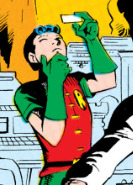
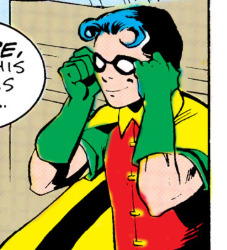
There's no one left in-universe who can or will talk about Jaybin as he really was.
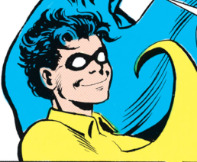
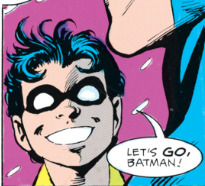
Bruce is the founder of the Jaybin Slander Department;
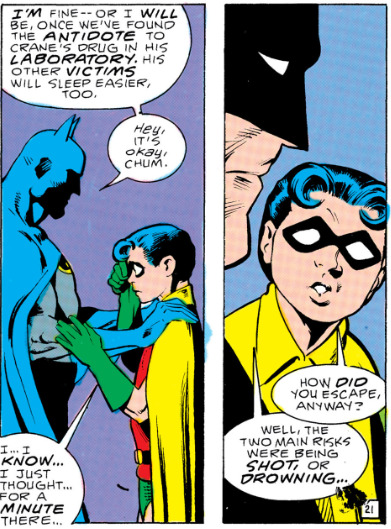
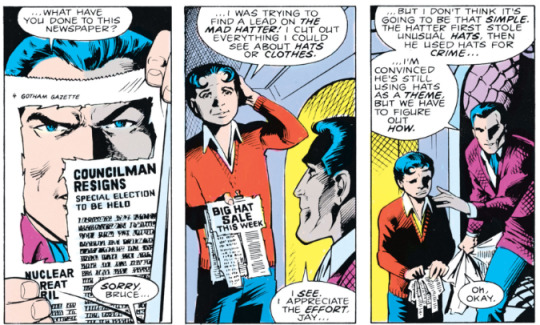
Alfred is no better.
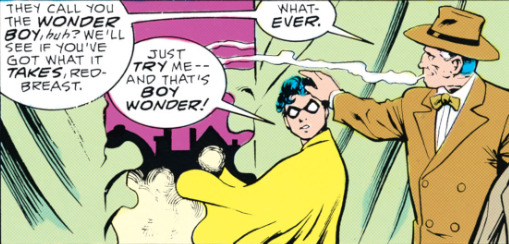
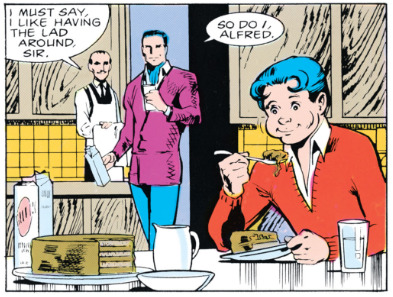
Dick wasn't around much, didn't know him that well.
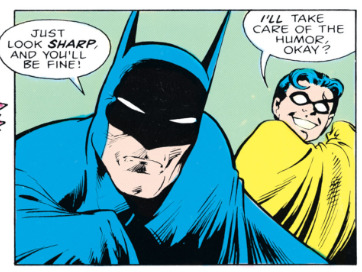
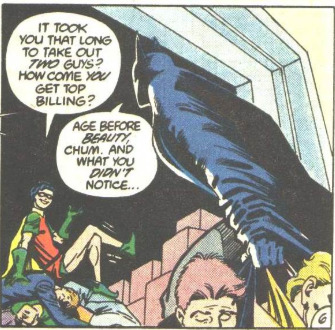
If Barbara ever interacted with him in his original run, I haven't found it yet.
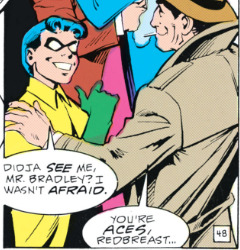
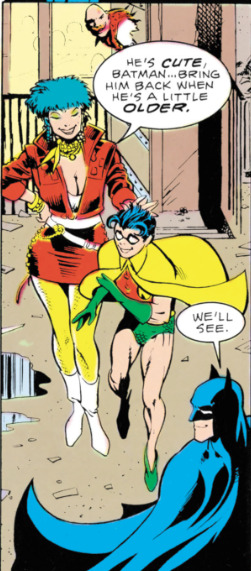
I mean, he had some interactions with the Teen Titans, but was he really close with any of them?
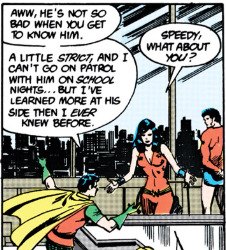
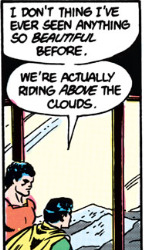
I suppose Gordon could, assuming he isn't in on the Jason-bashing. I haven't seen it but I could be missing something.
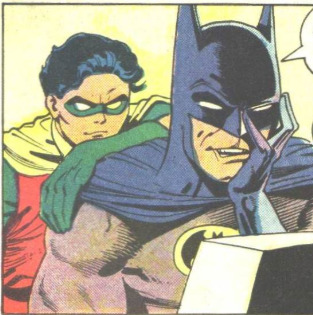
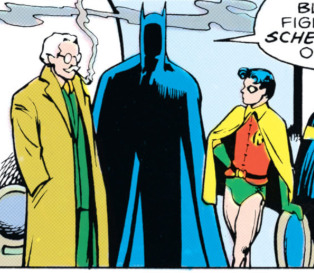
And, well, Jason... somehow, I don't think anyone's asking Jason what he was like as a kid, nor is he really a reliable source. Autobiographical memory is weird.
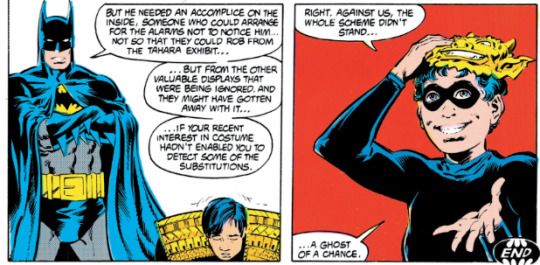

No one in-universe will ever really talk about this bright, friendly, eager kid, and it's a tragedy.
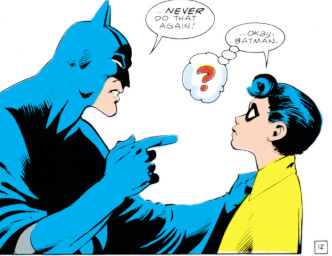
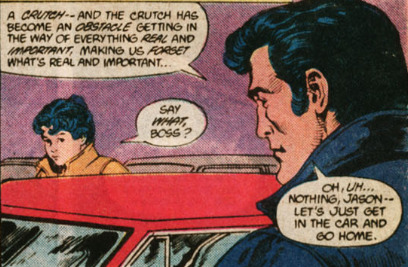
He was smart and clever and had so much compassion.
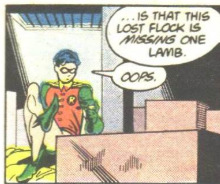
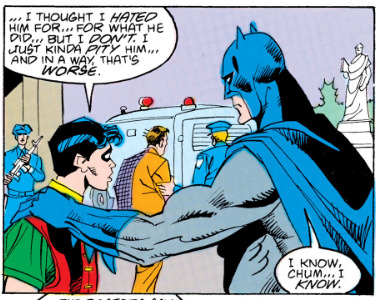
He wanted so badly to help people, and he found joy in his work as Robin.
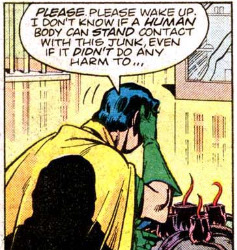
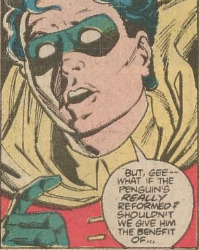
He had a dramatic flair and he was kind of a nerd and he was really funny on occasion.
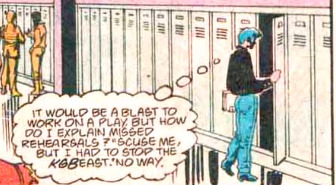
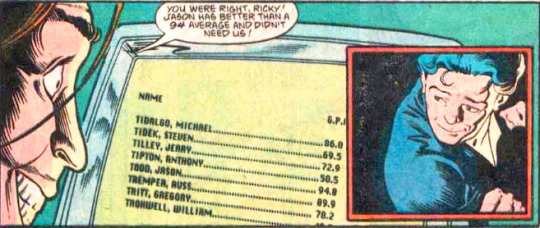
He was so deeply, fundamentally good, and the fact that somehow his legacy has been twisted into one of anger and recklessness is honestly a crime.
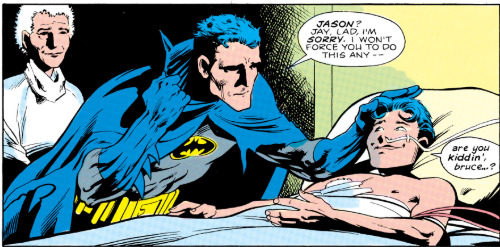
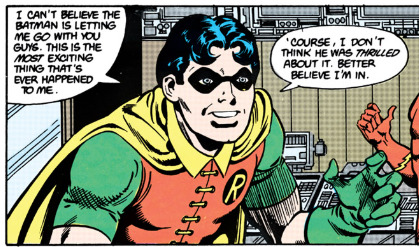
It makes me so desperately sad that there's not a single character who can even start to undo the lasting damage of a four-decade smear campaign against a kid who did nothing to deserve it.
#warrior's thoughts#jason todd#bruce wayne#jaybin#jaybin readthrough#comics#it's all jim starlin's fault btw#the way he writes jason does not align with any of jason's other appearances in contemporary books#every time dc writes something about jason being angry or reckless as a child an angel loses their wings#he has his moments of anger but it's not like he's not justified in those#also he's 12-15; i feel like some anger is normal at that age#and a lot of his seemingly reckless moments were actually calculated; he just didn't lay out the plan for bruce before doing it#jim starlin is the only writer who writes jason the way he does. everyone else seemed to understand that this was a good kid#it's really jarring to go from batman 413 to batman 415 (jay doesn't appear in 414) because of the stark difference in how jay is written#genuine question for mr starlin if you didn't like the character of robin why did you agree to write batman?#i can't be too upset; i really like red hood and it's only because jim starlin hated jason that we got utrh in the first place#but the character assassination of jaybin is just depressing#(btw if you want me to figure out image sources lmk i did not keep track lol)#also i should note that it is implied that dick and jason were actually pretty close#we just don't get to see much of it#so all we have are those implications. same with babs actually - she never appears in the jaybin era#but later comics (and her presence at his funeral) suggest they knew each other
509 notes
·
View notes
Note
How did Egg learn about Pebble asexuality?

Pebble told him
ko-fi
#ask ask ask#stobotnik#agent stone#doctor ivo robotnik#sonic movie universe#pebble and egg#it's the kind of thing you'd tell the guy you want to marry#i've never been in this situation as i've only ever had one partner#and she knew i was ace long before we dated#but pebble decided to kiss egg as soon as they both were conscious so now he has to have the talk
762 notes
·
View notes
Text
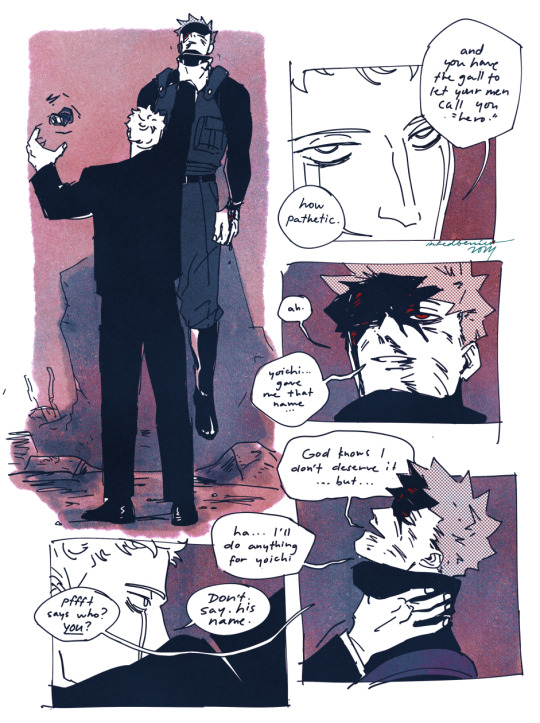
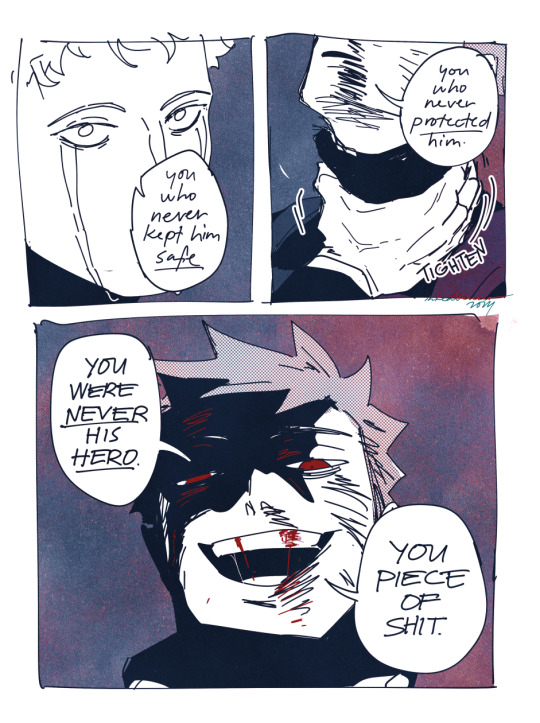
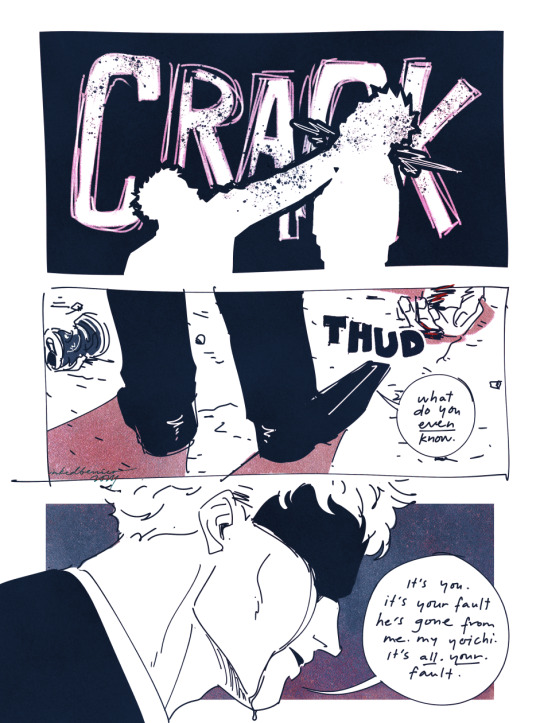

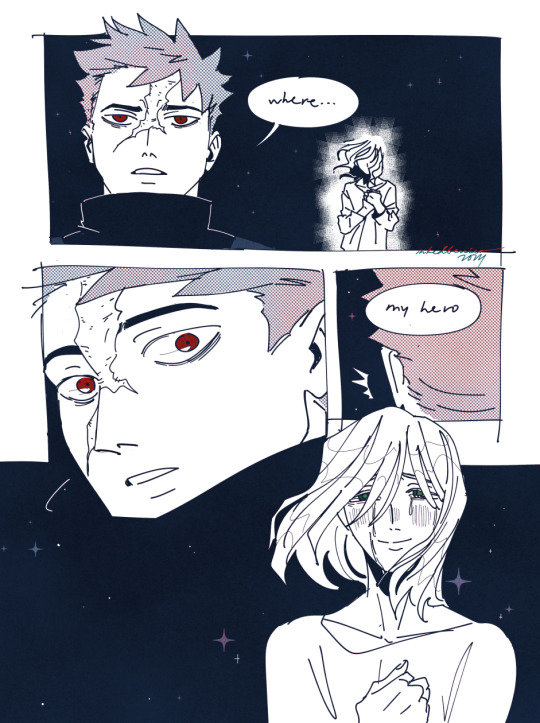
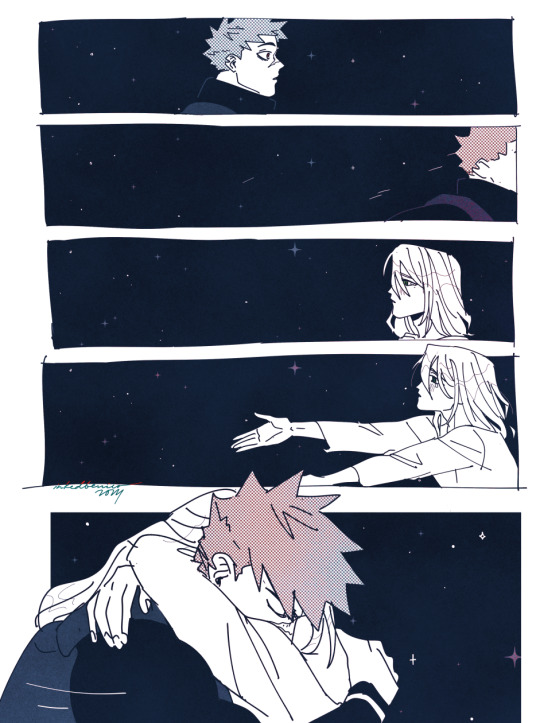
expanding on the thought of kudou getting the call sign 'hero' and afo getting irked by it for some reason
#to afo: devastating! the insignificant lout read you like a sunday strip at the back of a newspaper. How can you ever recover!#this is basically what i imagined when we got this scene from That chapter#i also have So Many Thoughts about the development of yoichi and kudou's relationship in the two months they knew each other#and also how kudou fared after yoichi died#horikoshi you shouldnt have given me so much wiggle room on this part of bnha;s lore who Knows what i might do!#it's the sweet spot of the right amount of canon material and the lack of it to let my imagination run wild#also afo is such an interesting character as soon as this scene hit#i have so many thoughts about him and his relationship with yoichi too#bnha#bnha spoilers#i guess??? for anime-only fans#mha#kudou mha#yoichi shigaraki#kudoichi#oh afo is here too i forgot lmao#afo#my art#fanart
2K notes
·
View notes
Text
neil knowing that his distrust of wymack and his physical reactions to him are from the experiences he's had with his father but his inability to recognize the discomfort he feels around renee and betsy as something that could be connected to his mother...ive gotta put this boy in a lab for real...
#aftg#neil josten#mary hatford#i think you can learn a lottt about mary just based on how he reacts to them#like the reason he's uncomfortable with bee and renee is ncus he recognizes they can see thru the masks he's putting on#and yes that would've been dangerous on the run not bcus of others but bcus of Mary. and the fact she was the only one who knew him fully#neil being unable to hide from mary in anyway (like his first kiss for example) leading to punishments...#plus mary's own ability to perform / put on a show (we can def extrapolate this) like nooo wonder he's so uncomfortable with them fr
759 notes
·
View notes
Text
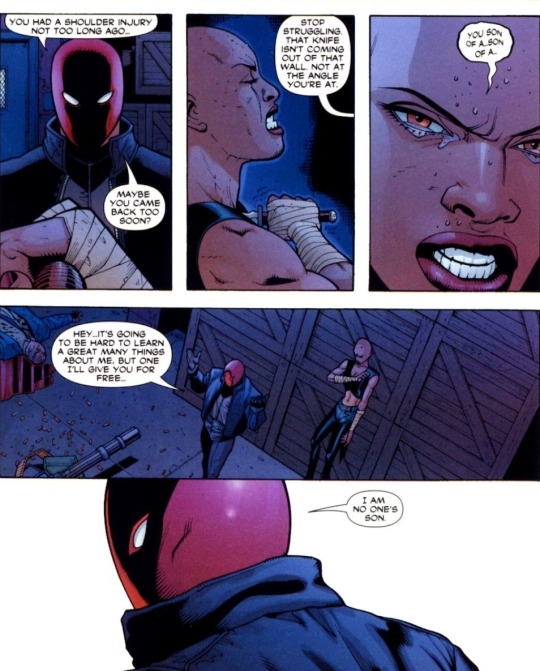
I think we don't talk nearly enough about this part of UTRH. I think we don't give nearly as much thought to this moment as we should. Because this declaration ("I am no one's son") is not dramatics, not another hyperbolised, theatrical line Jason loves to throw at his opponent. This is a desperate acceptance.
Because in a way, before his death, Jason's journey essentially was about finding a family; a parent, who cares, who loves. All he did as a Robin, he did it for love. He took the cape not because he was seeking revenge, not because of the necessity or a sense of rightness — first and foremost, he took the mantle for love. I said that once or twice there, but it is my favourite way to simplify the whole thing: Robin gave Jason magic, and magic in its core (for him) was safety and loving dad.
So, in a way, Jason (as a Greek character, if you squint) had his own journey from the beginning; a one that seemed fulfilled, once Bruce took him in. And then shit hit the fan, and he lost that in a way. That is where he goes in an adventure to find his mother, to become someone's son again. He finds his mother, he finds Sheila — except, everything goes wrong again, and she turns her back on him.
And then the journey ends. And Jason is back after many years.
And that's what he gets out of it. Accepts bitterly.
He is no one's son. And he hadn't been anyone's since Catherine Todd died.
#and then Bruce proves that Jason is not wrong to think that — he instantly rejects him after the reveal#first by telling Alfred to keep memorial bc Jason's return change *nothing*#and then by slicing his throat and leaving him to be#goodness gracious if you only knew how i love putting Jason in one blender with classic Greek terms#like the classic arch of character going on his own journey and returning wrong#odyssey if he was an anti-hero /J /J /J#or FATAL FLAW#because oh jason's whole story and the fate of being doomed comes from his fatal flow and i am going to tell more about it once#this post was half-cooked w ahoyimlosingmymind aka my pookie#couldn't stop think about this whole panel for two days#jason todd#red hood#batman#dcu#dcu comics#dc universe#batfamily#bruce wayne#batfam#sheila heywood#catherine todd#“we don't talk nearly enough about it” i scream as i cry and try to escape arkham asylum
670 notes
·
View notes